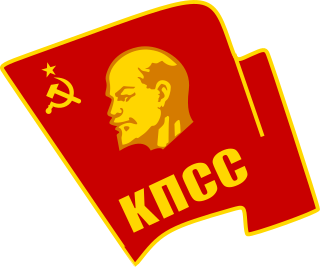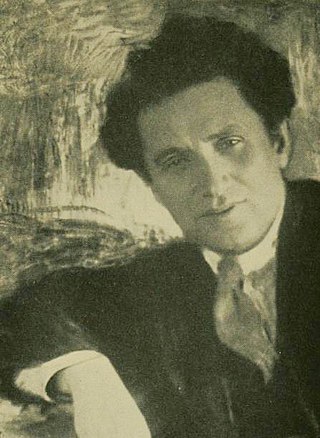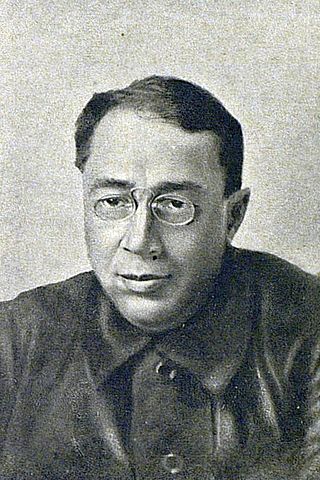
The Communist Party of the Soviet Union (CPSU), at some points known as the Russian Communist Party or All-Union Communist Party and sometimes referred to as the Soviet Communist Party (SCP), was the founding and ruling political party of the Soviet Union. The CPSU was the sole governing party of the Soviet Union until 1990 when the Congress of People's Deputies modified Article 6 of the 1977 Soviet Constitution, which had previously granted the CPSU a monopoly over the political system.

The Workers' Opposition was a faction of the Russian Communist Party that emerged in 1920 as a response to the perceived over-bureaucratisation that was occurring in Soviet Russia. They advocated the transfer of national economic management to trade unions. The group was led by Alexander Shlyapnikov, Sergei Medvedev, Alexandra Kollontai and Yuri Lutovinov. It officially existed until March 1921 when it was forced to dissolve by the 10th Congress of the Russian Communist Party (Bolsheviks), and semi-clandestinely until the subsequent 11th Congress in 1922, where its main exponents teetered dangerously on the verge of being purged for fractionist activity. In some aspects, it was close with the German council communist movement, although there is no information about direct contacts between these groups.

An index of articles related to the former nation known as the Soviet Union. It covers the Soviet revolutionary period until the dissolution of the Soviet Union. This list includes topics, events, persons and other items of national significance within the Soviet Union. It does not include places within the Soviet Union, unless the place is associated with an event of national significance. This index also does not contain items related to Soviet Military History.
The history of the Communist Party of the Soviet Union was generally perceived as covering that of the Bolshevik faction of the Russian Social Democratic Labour Party from which it evolved. The date 1912 is often identified as the time of the formation of the Communist Party of the Soviet Union as a distinct party, and its history since then can roughly be divided into the following periods:

The 10th Congress of the Russian Communist Party (Bolsheviks) was held during March 8–16, 1921 in Moscow, Russia. The congress dealt with the issues of the party opposition, the New Economic Policy, and the Kronstadt Rebellion, which started halfway through the Congress. The Congress was attended by 694 voting delegates and 296 non-voting delegates.

The 17th Congress of the All-Union Communist Party (Bolsheviks) was held during 26 January – 10 February 1934. The congress was attended by 1,225 delegates with a casting vote and 736 delegates with a consultative vote, representing 1,872,488 party members and 935,298 candidate members.
The 12th Congress of the Russian Communist Party (Bolsheviks) was held during 17–25 April 1923 in Moscow. The congress elected the 12th Central Committee. It was attended by 408 delegates with deciding votes and 417 with consultative votes, representing 386,000 party members. This was the last congress of the Russian Communist Party (Bolsheviks) (RCP(b) during Vladimir Lenin's leadership, though Lenin was unable to attend due to illness.

The 14th Congress of the All-Union Communist Party (Bolsheviks) was held during 18–31 December 1925 in Moscow. The congress elected the 14th Central Committee. The congress is best remembered for its declaration of intent to pursue rapid industrialisation of the Soviet Union rather than seeking lasting accommodation as an agricultural producer within the international system of capitalist world economy. It also marked the victory of the majority faction of Joseph Stalin and Nikolai Bukharin over the "New Opposition" headed by Grigory Zinoviev and Lev Kamenev.

The 15th Congress of the All-Union Communist Party (Bolsheviks) was held during 2–19 December 1927 in Moscow. It was attended by 898 delegates with a casting vote and 771 with a consultative vote.
The 18th Congress of the Russian Communist Party (Bolsheviks) was held during 10–21 March 1939 in Moscow. It elected the 18th Central Committee.
The 8th Congress of the Russian Communist Party (b) was held in Moscow 18–-23 March 1919. The Congress was attended by 301 voting delegates who represented 313,766 Party members. A further 102 delegates attended with speaking rights, but no vote. It elected the 8th Central Committee.

Sergey Ivanovich Syrtsov was a Russian Soviet politician and statesman. Syrtsov is best remembered for having served as the head of the republic government of the Russian SFSR from 1929 until his removal in 1930 for plotting to remove of Joseph Stalin as head of the All-Union Communist Party (bolsheviks).

The 9th Congress of the Russian Communist Party took place from 29 March 1920 till 5 April 1920. The Congress opened in the Bolshoi Theatre with an introductory speech by Vladimir Lenin. The following meetings of the Congress took place in one of the buildings of the Kremlin. Present at the Congress were 715 delegates, of whom 553 had the right to vote and 162 were delegates with voice but no vote.

The All-Russian Congress of Soviets evolved from 1917 to become the supreme governing body of the Russian Soviet Federative Socialist Republic from 1918 until 1936, effectively. The 1918 Constitution of the Russian SFSR mandated that Congress shall convene at least twice a year, with the duties of defining the principles of the Soviet Constitution and ratifying peace treaties. The October Revolution ousted the provisional government of 1917, making the Congress of Soviets the sole, and supreme governing body. It is important to note that this Congress was not the same as the Congress of Soviets of the Soviet Union which governed the whole Soviet Union after its creation in 1922.

Grigory Yevseyevich Zinoviev was a Soviet revolutionary and politician. He was an Old Bolshevik and a close associate of Vladimir Lenin. During the 1920s, Zinoviev was one of the most influential figures in the Soviet leadership and the chairman of the Communist International.
"On the Cult of Personality and Its Consequences", popularly known as the "Secret Speech", was a report by Soviet leader Nikita Khrushchev, First Secretary of the Communist Party of the Soviet Union, made to the 20th Congress of the Communist Party of the Soviet Union on 25 February 1956. Khrushchev's speech was sharply critical of the rule of the deceased General Secretary and Premier Joseph Stalin, particularly with respect to the purges which had especially marked the last years of the 1930s. Khrushchev charged Stalin with having fostered a leadership cult of personality despite ostensibly maintaining support for the ideals of communism. The speech was leaked to the West by the Israeli intelligence agency Shin Bet, which received it from the Polish-Jewish journalist Wiktor Grajewski.

The Central Committee of the Communist Party of the Soviet Union was the executive leadership of the Communist Party of the Soviet Union, acting between sessions of Congress. According to party statutes, the committee directed all party and governmental activities. Its members were elected by the Party Congress.
The Central Committee (CC) composition was elected by the 16th Congress, and sat from 13 July 1930 until 10 February 1934. Its 1st Plenary Session elected the Politburo, Secretariat and Orgburo. The 16th Congress was the first party convention since the 13th Congress which saw no organized opposition, and the first congress in party history in which there was no opposition to the party leadership. Ukrainian historian Oleg Khlevniuk considers the period 1930–1934 to be a "transitional period" between collective leadership (referred to interchangeably by him as oligarchy) and Joseph Stalin's personal dictatorship (autocracy). The removal of Alexei Rykov, the Chairman of the Council of People's Commissars (SNK, the Soviet government), from the Politburo at the 1st Joint Plenary Session of the CC and the Central Control Commission (CCC) has been marked in historic literature as "the definitive Stalinization of that body [Politburo]" according to Khlevniuk.

Sergei Ivanovich Gusev was a Russian revolutionary, a founding member of the Bolshevik faction of the Russian Social Democratic Labour Party (RSDLP), and Soviet politician.
Individuals and events related to 1921 in the Civil War-era Russia.











